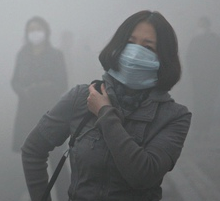
As Pollution Worsens, China Turns to Big Data

You’ve got to see, smell, feel Beijing’s smog to believe it.
Looking out a high window of a tall building, the air is opaque. Despite rules against them, vendors cook and sell food on side streets using charcoal grills. Prevailing winds from the Gobi Desert distribute dust throughout the sprawling capital. The desert dust along with particulates from high-sulfur coal burned in the city’s power plants prompt car owners to brush off their vehicles the way we might clear snow from a car after a dusting.
China’s unsustainable air pollution crisis appears intractable. Despite spending billions to subsidize a domestic renewable energy industry, air quality grows worse every year in Beijing, Shanghai and other major Chinese cities as energy demand skyrockets.
Enter IBM, armed with cognitive computing and other big data tools. Its proposed solution called “Green Horizon” is a decade-long initiative focusing on air quality and renewable energy management along with energy conservation efforts. Whether finer-grained data along with analytics tools can improve air quality in China remains to be seen.
It’s probably worth a try since little else has worked.
IBM said it would initially work with the Beijing Municipal Government to develop potential data solutions to the city’s monumental air pollution problems. IBM said it would supply tools such as cognitive computing technology, optical sensors and Internet of Things networking.
All are based on the company’s big data and analytics platform that also leverages IBM’s experience with weather prediction and climate modeling.
IBM was quick to praise its Chinese partners for confronting its environmental problems head on. It’s true that the Middle Kingdom has made enormous strides since the economic reforms launched by Communist Party boss Deng Xiaoping in the late 1970s.
“While other nations waited until their economies were fully developed before taking comprehensive action to address environmental issues, China can leverage IBM’s most advanced information technologies to help transform its energy infrastructures in parallel with its growth,” D.C. Chien, chairman and CEO of IBM Greater China Group, stressed in a statement announcing the Green Horizon project.
Still, the vast majority of China’s electricity continues to be generated from high-sulfur coal, which accounts for much of the air pollution in large Chinese cities like Beijing. Until that reality is altered, it’s hard to see how big data could help slow much less reverse China’s monumental air pollution.
Responds Lu Qiang, a professor at China’s prestigious Tsinghua University and a fellow with the Chinese Academy of Science: “The key to tackling environmental problems is not only monitoring emissions but adopting a comprehensive approach to air quality management and addressing the issues at their roots.”
Qiang added that Green Horizon at the very least would help foster “joint innovation across the entire energy value chain.”
According to IBM, the Beijing Municipal Government is expected to invest more than $160 billion to improve air quality while seeking to reduce harmful “fine particulate matter” 25 percent by 2017. One of the first steps in the Green Horizon initiative will be working with the municipal government to develop a system for pinpointing the type, source and level of emissions, then predict air quality across the city.
More accurate air quality readings would be helpful since many residents discount the municipal government’s current estimates of air quality.
IBM said it would use cognitive computing systems to analyze streams of real-time data generated by air-quality monitoring stations, weather satellites and optical sensors. All will be linked via IBM’s version of the Internet of Things.
One product will be an air quality version of a weather forecast map showing the sources and dispersion of pollution across the Chinese capital 72 hours in advance. The visualization will have “street-scale resolution,” IBM promised.
There was no word from the partners about whether Beijing’s air quality Internet of Things will be able to detect the smoke from all those charcoal grills.
Related items:
IBM Presides Over ‘Marriages Made with Data’
Huawei, CCTV Partner to Dev on High Density ‘Big Data’ Storage



























